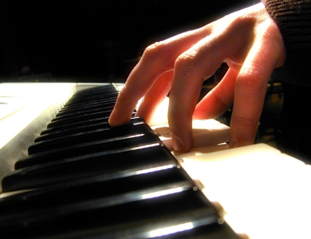The Piano Teacher's Perspective
In most every neighborhood, there's one house that emanates piano music morning, noon, and night If anyone played the piano that much, their hands would go numb. Fortunately, there's no medical emergency. It's the local piano teacher.
Robin Watson has been teaching piano to both children and adults in Olympia, Washington, for sixteen years. "I was having babies and didn't know what else to do, so I threw out a shingle." She's been busy ever since, and presently teaches 25 students every week.
A typical load for local piano teachers is 25 to 30 students per week, each taking a half-hour lesson, says Robin. There are several area piano teachers with more than 40 students, and at least one with over 50.
Gordon Miller has been playing the piano since she was 5 years old and has been teaching in nearby Tumwater for 6 years. She has 30 half-hour students per week, and spends her spare time preparing lessons, reviewing new music literature, attending workshops and meetings, and listening to piano music.
Finding a good piano teacher.
"What's important is personality fit not just proximity," says Gordon. "Interview the teacher to get a feel for the right teacher for you. But the most important thing is to find someone you'll get along with," says Robin.
Spend some time getting to know the teacher, either on the phone or in person. And make sure you have enough time available to practice. "Ask the teacher what kind of time commitment is required each week, and what their recital schedule is," says Robin.
Typically, recitals are small concerts, usually in the teacher's home or local church, where the students play for each other, family and friends. Expect to devote some extra time and energy getting ready for a recital.
If you can, decide what style of music you want to learn. Bach or Barbra? Hymns or Late Romantic? Oscar Peterson jazz or Garth Brooks honky-tonk? In the last fifteen years, Robin says, a much wider variety of method books and sheet music has become available. Discuss with the teacher the style with which he or she is experienced.
Also, it's good to hear the teacher play the piano. It's not necessary that she be a world-famous virtuoso, but she should play well enough to be able to demonstrate complex subtleties on the keyboard. And, if you really like the way she plays, you'll gain instant respect for her as a musician. That will make her job as teacher easier, and yours as student more fun.
Becoming a successful piano student. 
"Set aside the same time period every day for practice, and get your family members to agree," says Robin. "Change the order of pieces you're working on to keep from getting bored." When practicing at home, "Remember to read what the teacher writes in your lesson book" says Gordon. To stay on a steady schedule, she recommends her students check off each day they practice in their lesson notebooks.
It's important to have a good piano and keep it in good condition, adds Robin. "Students get thrown off when they come to lessons at my home, because they're not used to a piano that's in tune. It happens all the time." Pianos need other maintenance too, and you should prepare for those costs, says Gordon. "Find a good piano technician who will explain to you what's going on with your piano, and don't be afraid to call him or her immediately if you've got a problem." Robin recommends you learn the piano's nomenclature so you can discuss service needs with your technician.
If your expectation is to become an accomplished pianist, be prepared to take lessons for at least three years. "People don't realize the length of time it takes to learn to play well," Robin says.
But even simple music sounds beautiful if played with sensitivity. Practice regularly and let your creativity loose. And pay attention to your piano teacher! Because if you do, your house too will be bursting with piano music.
And you'll be the star in the spotlight.
Return to Home Page
|


